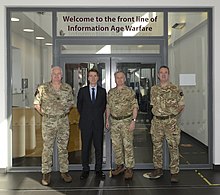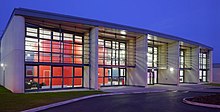Strategic Command (United Kingdom)
[3] The Secretary of State for Defence, Penny Mordaunt, announced in July 2019 that Joint Forces Command would be renamed as 'Strategic Command', dealing with the Ministry of Defence's transformation programme and taking responsibility for a range of strategic and defence-wide capabilities.[4] Strategic Command will integrate fighting across Air, Land, Sea, Cyber and Space and ensure the armed services operate at the forefront of the information environment.DI primarily provides intelligence and advice to inform policy, deployment and research decisions, working alongside other government departments, agencies, allies, the EU and NATO.[23][11] The Director of Capability is responsible for delivering a joint capability strategy, including in areas such as special forces; military counter-terrorism, explosive ordnance disposal, CBRN and Command, Control, Communications, Computers, Intelligence, Surveillance and Reconnaissance (C4ISR).[10] Defence Digital was created in 2019 when Information Systems & Services and a number of organisations were brought together; at that time it had an annual budget of over £2 billion and about 2,400 staff including military, civil servants and contractors.[11] Defence Digital activity is largely at MOD Corsham in Wiltshire, and it has a presence at other sites including: Joint Force Development is led by Director General Joint Force Development Air Marshal Ian Gale MBE.It "plans and develops the current and future Joint Force and leads capability for concepts and doctrine, education and training, Defence-wide exercises, experimentation, analysis and lessons".[30][31] The Development, Concepts and Doctrine Centre (DCDC) is the MOD's think tank and is responsible for research work in support of joint concepts and doctrine, as well as those relating to the Royal Navy, Royal Air Force and British Army.[32] The Joint Counter-Terrorism Training and Advisory Team (JCTTAT) is based at Risborough Barracks in Kent.



Allied Joint Force Command BrunssumAllied Joint Force Command NaplesJoint Force Command NorfolkUnited States Joint Forces CommandArmy Strategic Command (United Kingdom)United KingdomRoyal NavyBritish ArmyRoyal Air ForceJoint CommandMinistry of DefenceNorthwood HeadquartersHertfordshireCommanderGeneralSir James HockenhullLieutenant GeneralTom Copinger-SymesLord LeveneDefence SecretaryLiam FoxChief of Defence Procurementfour-star ranking officerDirectorate Special ForcesDefence AcademyDevelopment Concepts and Doctrine CentrePermanent Joint HeadquartersChief of the Defence StaffVice Chief of the Defence StaffGeneral Sir Nicholas HoughtonAir Chief MarshalSir Stuart PeachPenny Mordauntsatellite communicationsintelligence, surveillance and reconnaissancepositioning, navigation and timingUnited Kingdom Space CommandRAF High Wycombein LondonRAF Mount PleasantFalkland IslandsBritish Overseas TerritoriesBritish Forces CyprusSovereign Base Areas of Akrotiri and DhekeliaBritish Forces South Atlantic IslandsSouth Georgia and the South Sandwich IslandsBritish Forces GibraltarGibraltarBritish Indian Ocean TerritoryDiego GarciaBritish Defence Singapore Support UnitSingaporeDefence Intelligencemilitary intelligencecyber warfareGCHQ CheltenhamMOD CorshamRoyal Navy ReserveLand Information Assurance GroupRoyal Auxiliary Air Force – No. 600 (City of London) SquadronRoyal Auxiliary Air Force – No. 614 (County of Glamorgan) SquadronJoint Intelligence Training GroupChicksandsDefence Medical ServicesSurgeon GeneralDMS WhittingtonCommand, Control, Communications, Computers, Intelligence, Surveillance and ReconnaissanceRAF HaltonDirector Special ForcesUK Special ForcesSpecial Boat ServiceSpecial Air ServiceSpecial Reconnaissance RegimentSpecial Forces Support Group18 (UKSF) Signal RegimentJoint Special Forces Aviation Wingchief information officerinformation technologyInformation Systems & ServicesBlandford CampRoyal Corps of SignalsISS BoddingtonRAF HenlowAir MarshalIan GaleBritish Armed ForcesCivil ServiceDefence Centre of Training SupportRoyal College of Defence StudiesStanding Joint Force HeadquartersDevelopment, Concepts and Doctrine Centrethink tankcombined operationsJoint Arms Control Implementation Grouparms controlConventional Armed Forces in Europe (CFE) TreatyVienna DocumentOpen Skies TreatyRisborough BarracksSir Richard BarronsSir Christopher DeverellSir Patrick SandersTwitterThe London GazetteMain Building, WhitehallArmed ForcesService branchesNaval ServiceRoyal MarinesnationScotlandthe IrishDefence CouncilSecretary of State for DefenceMinister of State for the Armed ForcesMinister of State for Defence Procurement and IndustryMinister of State for DefenceParliamentary Under-Secretary of State for Veterans and PeopleMilitaryVice-Chief of the Defence StaffFirst Sea Lord and Chief of Naval StaffChief of the General StaffChief of the Air StaffCommander Strategic CommandChief of Defence PeoplePermanent Under-Secretary of State for Defence
